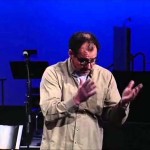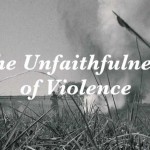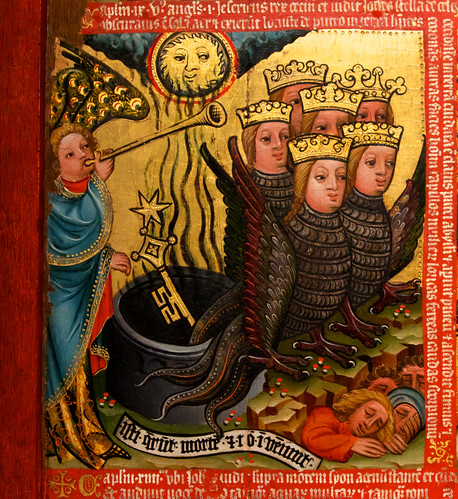We run our website the way we wished the whole internet worked: we provide high quality original content with no ads. We are funded solely by your direct support. Please consider supporting this project.
On the Language of “Revolution”
Question: The banner of your website and the thrust of much of your teaching focuses on “revolution.” While I can see a radical call in some of the sayings of Jesus, especially if he were addressing upper-middle class North Americans, I wonder if attaching revolutionary language to his teaching seems a stretch. He did not join with the Zealots of the day. He said to his captors, “Am I leading a rebellion, that you come at me with clubs and swords?” Revolutionary culture is connected with all sorts of movements, many stemming from the Enlightenment and communism that seemed to embrace ideologies of autonomy and methodologies of violence. That seems to conflict with the spirit of your own communitarian and pacifist teachings. Could you explain why you use revolutionary language?
Answer: I understand your concern about the world’s association of revolution with violence and social upheaval etc. Jesus’ kingdom certain wasn’t that. At the same time I think that the Kingdom inaugurated by Jesus was far MORE revolutionary, not less, than common examples of revolution, whether the American, French, or Russian. Everything Jesus did revolted against aspects of the culture and creation that weren’t consistent with God’s will, and thus revolted against the principalities and powers that (in a first century apocalyptic context) were believed to be behind those aspects of society and creation. And he revolted, ultimately, by not only refusing to hate his enemies, but instead to love and bless his enemies, which is the opposite of the world’s way of revolting. So I want to reclaim the most radical “revolt” word we have available and redefine it within the kingdom. This word is revolution.
The same objection has been raised about my “spiritual warfare” language, and I give the same response, since warfare language permeates the Bible, including the NT.
The Bible has a great example of using revolution/warfare language and turning it on its head to mean the opposite of what it means in the world. It’s found in the book of Revelation. John employs dozens of violent symbols from the OT and apocalyptic literature of his day and he turns them on their head to mean the opposite. [I’m in the middle of preaching a six week series on Revelation right now]. So I feel there is biblical warrant for doing the same today.
Nevertheless, you are concerned about the right things, and it just means we have to make an extra effort to be sure we are communicating the kind of revolution and warfare that is consistent with the revolution and warfare of the cross. The cross defines the revolution.
Blessings,
Greg
For more on the topic of revolution, see Greg’s book Myth of a Christian Religion: Losing Your Religion for the Beauty of a Revolution. This book introduces 12 ways that the revolution should stand against the principalities and powers of the world.
For the sermon series that was the precursor to this book, click here.
For the recent sermons from the series Rescuing Revelation where I outline how God takes revolutionary language and turns it on its head, click here.
Category: General
Tags: Enemy Love, Kingdom, Love, Non-Violence, Pacifism, Revelation, Revolution, Viva la Revolution!
Related Reading

What I – a Pacifist – Would say to Obama About the Crisis In Syria
Over the last week many of you have written ReKnew asking me to weigh in on the crisis in Syria. Does being a pacifist mean that I am opposed to America violently intervening to keep Assad from using chemical weapons against his own people? And if so, what would I say if Obama asked for…

Sermon Clip: How Christians Should Respond to Ferguson
In this clip from this weeks sermon, Greg Boyd comments on how Christians should respond to the events in Ferguson St. Louis and how that response should always be in love and to help heal both sides. The full sermon is here: http://whchurch.org/sermons-media/sermon/heart-smart-qa

The Unfaithfulness of Violence
For more videos like this be sure to visit The Work of the People.

Guest Post: Culture War Neighbors by Bonnie Kristian
Matteo Parrini via Compfight The first time I was aware of meeting a gay person, I was 18. I took a summer job waiting tables, and it turned out two of my coworkers were attracted to people of the same sex. One, a waiter in his 40s, fit every stereotype on Will and Grace. The…

Are You Fully Alive? Here’s the Key
Image by rashdada via flickr. The cross reveals the full truth about us. This truth reconnects us with our true source of life, which in turn heals our idol addictions. This dimension of the cross is frankly so breathtakingly beautiful that, so far as I can tell, very few followers of Jesus have ever really grasped it.…

Will Violence against ISIS Root Out Evil?
Image by arbyreed via Flickr Fallen humans tend to identify their own group as righteous and any group that opposes them as evil. If they were not evil, we tend to believe, no conflict would exist. Hence, the only way to end the conflict is to rid the world of this evil. This is the age-old “myth…

